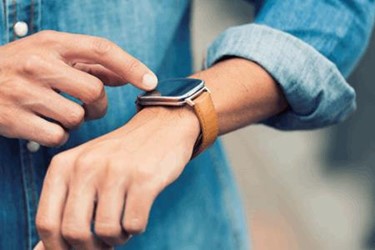Google And Apple Compete For Clinical Trial Supremacy

By Ed Miseta, Chief Editor, Clinical Leader

The Apple Watch, along with Apple’s ResearchKit, has already found a home in the clinical space. Passively capturing human health data is becoming an integral part of both healthcare and clinical research. While some notable studies have already incorporated the device, many clinical executives feel the most exciting aspect of the technology is its future potential.
But the Apple Watch just got some competition in the clinical space. In April 2017, we saw the introduction of the Verily Study Watch. If you don’t know, Verily (formerly Google Life Sciences) is the research organization of Alphabet Inc. devoted to the study of life sciences. According to Verily, the Study Watch is the next step in the company’s targeted efforts to create new tools for unobtrusive biosensing. Translation: Let’s find an easier way to acquire data from patients.
Although numerous wearables are available to patients and health enthusiasts, Verily felt researchers needed a “scalable collection of rich and complex data sets across clinical and observational studies.” A blog published by Verily also notes the architecture of the watch was tailored specifically for high-quality signals and seamless usage, with consideration given to the needs of observational studies and patients. Design and functionality decisions were reinforced via feedback from users, researchers, and clinicians.
Other key features of the Study Watch include:
- Multiple sensors designed to measure signals pertinent to cardiovascular, movement disorders, and other therapeutic areas, such as electrocardiogram (ECG), heart rate, inertial movements, and electrodermal activity.
- Long (up to one week) battery life.
- Large storage and compression capability to store weeks’ worth of data, eliminating the need for frequent syncs.
- A processor that supports real-time algorithms.
- Firmware designed for future extensions.
Many of these design features were clearly incorporated to get users of the Study Watch to wear it continuously, something that has been a challenge for manufacturers of wearable devices. Because the device stores health data, all data is encrypted for security purposes. Encrypted data is uploaded and processed in the cloud using Verily’s backup algorithms and machine learning tools, and the highly scalable infrastructure can serve population studies consisting of large volumes of data.
Study Watch is already slated to be used in several studies, including the Personalized Parkinson’s Project, a study to identify patterns in the progression of Parkinson’s disease, and the forthcoming Project Baseline study that explores transitions between health and disease.
What Is Baseline?
If you are not yet familiar with the Project Baseline study, you can look at it as Google’s effort to understand how and why people get sick, with the ultimate goal of improving human health. Verily has already announced (also in April 2017) the first Baseline project. Conducted in collaboration with Duke University and Stanford Medicine, the four-year study will recruit up to 10,000 patients to understand how people transition from healthy to sick and identify risk factors for diseases. Participants will be recruited in California and North Carolina. A recent article from Fortune notes the project will collect data and biological samples such as blood and saliva. The data will be gathered from participants via repeat clinical visits, surveys and polls, and the Study Watch with Baseline mobile app.
“That means the Project Baseline study dataset will include clinical, molecular, imaging, self-reported, behavioral, environmental, sensor, and other health-related measurements,” says Jessica Mega, chief medical officer for Verily, in a recent blog post. “To organize this Information we are creating an infrastructure that can process multi-dimensional health data, much of which has never been combined for an individual. Our vision is that this data platform can serve as a single query source and may be used for more seamless data integration and collaboration.”
Verily acknowledges its vision cannot be reached by operating in a silo. Therefore, it is working closely with industry partners. In addition to Duke and Stanford, teams across Verily are connecting with partners from academia, medicine, science, patient advocacy, engineering, and design. Additionally, de-identified data from the study will be made available to qualified researchers in the future to spur new ideas. The participants in the study will also have the option of receiving certain data and health results to share with their physicians.
“The Project Baseline study is therefore a united effort to map human health,” adds Mega. “To achieve this goal, we are creating a new set of tools for medical discovery, with the aspiration that these tools and others from the broader community will pave the way for rich real-world insights, and potentially add to the way care is delivered.”
With the Apple Watch already gaining traction in the clinical space, will the entrance of Study Watch create a technology clash of the titans between Google and Apple? Not yet. The Apple Watch was certainly marketed to consumers as a competitor to other fitness wearables on the market. When combined with the ResearchKit app, the watch becomes a tool for clinical researchers. But if you are thinking about picking up a Study Watch for yourself, you will have to put those plans on hold. Verily has stated the watch is not for sale, and is currently being used for research purposes only.
